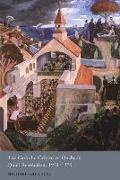Mehr lesen
The Catholic Origins of Quebecs Quiet Revolution challenges a version of history central to modern Quebecs understanding of itself: that the Quiet Revolution began in the 1960s as a secular vision of state and society which rapidly displaced an obsolete, clericalized Catholicism. Michael Gauvreau argues that organizations such as Catholic youth movements played a central role in formulating the Personalist Catholic ideology that underlay the Quiet Revolution and that ordinary Quebecers experienced the Quiet Revolution primarily through a series of transformations in the expression of their Catholic identity. In so doing Gauvreau offers a new understanding of Catholicisms place in twentieth-century Quebec. Catholicism emerges as an institution increasingly dominated by the priorities of laypeople and as the central force in Quebecs cultural transformation during the mid-twentieth century. He shows that the Church espoused a particularly radical understanding of modernity between the 1930s and the 1960s, especially in the areas of youth, gender identities, marriage, and family.
Über den Autor / die Autorin
Michael Gauvreau, professor of history at McMaster University, is the author and editor of numerous works, including Mapping the Margins: Families and Social Disciplines in Canada, 1700-1970 and Cultures of Citizenship in Postwar Canada, 1940-1955.

